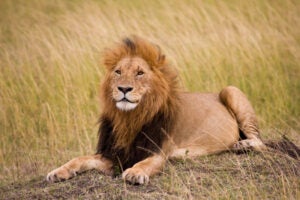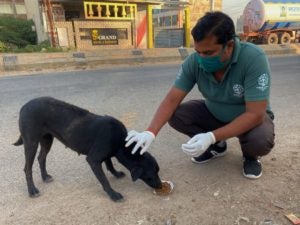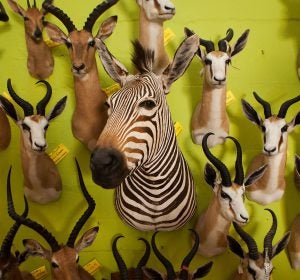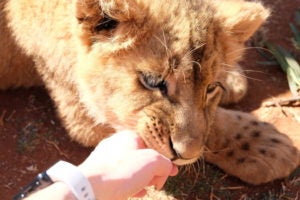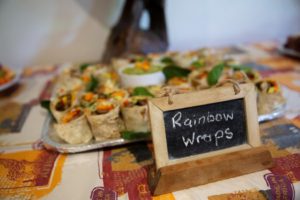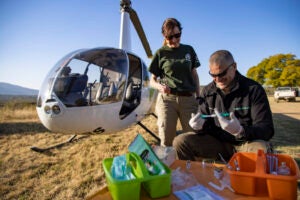
CAPE TOWN—This World Elephant Day, Humane Society International/Africa is celebrating the treatment of its 34th population of African elephants using the immunocontraception vaccine as a humane population growth control method. This brings the total number of females under treatment in South Africa to 1,035 – which is more than half of all breeding-age female elephants outside of the Kruger National Park, which does not use contraception.
As an effective alternative to the traditional method of culling – when family groups are gunned down – immunocontraception uses the female elephant’s own immune response to block egg fertilisation. Female elephants over the age of 10 years are treated remotely from a helicopter with a dart that contains the immunocontraception vaccine and a marking substance.that creates a quick reference of which animals have been darted. The dart falls out shortly afterwards. The animals do not need to be immobilised to be treated and vaccinations are completed within minutes.
Download photos and video of elephants receiving the immunocontraception vaccine.
“Shooting these magnificent animals to control their numbers is an antiquated, cruel and unnecessary way to deal with an elephant population that is increasingly squeezed by human encroachment. Immunocontraception is the future of humane elephant conservation,” said Audrey Delsink, wildlife director for HSI/Africa and an elephant biologist.
“Elephants are widely acknowledged as highly cognitive, sentient beings with close-knit family bonds that span generations. It has also been well documented that these sensitive animals suffer symptoms of post-traumatic stress for decades after undergoing traumatic experiences such as capture from the wild, culling or poaching,” said Delsink.
Humane Society International and the Humane Society of the United States have funded cutting-edge research on the use of this non-steroidal, non-hormonal and humane method of elephant population control since 1996. HSI adopts a science-based approach, and with its research partners, has published numerous scientific papers documenting the vaccine’s efficacy, reversibility, lack of behavioural side effects and cost-effectiveness.
“African elephants face many challenges, particularly habitat loss,” added Delsink. “The past three decades have seen their habitat shrink by half, which also leads to increased opportunities for human-elephant conflict on the fringes of neighbouring rural communities, parks and reserves.”
HSI/Africa is working to protect elephants from these and other threats through advocacy, education, policy and regulatory reforms, ivory-demand reduction programmes and on-the-ground conflict resolution efforts. It is the only non-governmental organisation that specifically works on humane methods of birth control in and around zones where elephants could come into conflict with surrounding communities.
With natural processes such as elephant migration curtailed by fences and borders and elephants limited to smaller areas, the ecosystem within the animals’ range also needs to be carefully managed. With females able to produce eight to 10 calves in their lifetime, elephant populations are able to double every 10 to 15 years, making immunocontraception a vital tool in elephant management plans.
Boys will be … bulls
Young male or bull elephants are sometimes incorrectly labelled as ‘problem’ or ‘damage-causing’ animals because they do what they are biologically programmed to do: to seek out new territory after leaving their natal herd. In the process, conflict with people can occur and the animals may be legally destroyed.
To mitigate such conflict in a community in rural KwaZulu-Natal, HSI/Africa and partners Global Supplies and Conservation Outcomes recently deployed three satellite collars on two bulls and a member of a family herd. The collars facilitate the remote monitoring of the animals’ movements: when a collared elephant nears a defined perimeter, reserve management are alerted and can then take steps to reduce the chance of conflict.
This is the second community reserve in the province where the partnership has deployed immunocontraception and satellite collars, embracing science and technology to provide more humane solutions that allow people and elephants to peacefully co-exist.
Download photos and video of elephants receiving the immunocontraception vaccine.
ENDS
Media contact: Marisol Gutierrez, HSI/Africa media and communications manager, +27 72 358 9531, mgutierrez@hsi.org

